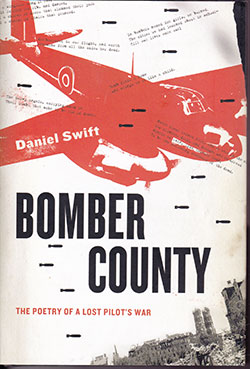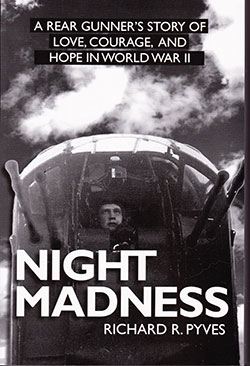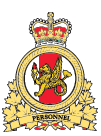Book Review Essays
Re-Examining the Bombers: A Book Review Essay
by Sean M. Maloney
Daniel Swift, Bomber Country:
The Poetry of a Lost Pilot’s War,
Farrar, Straus and Giroux, 269 pages.
Richard R. Pyves, Night Madness:
A Rear Gunner’s Story of Love, Courage,
and Hope in World War II,
Red Deer Press, 319 pages.
For more information on accessing this file, please visit our help page.
These two books operate from different standpoints but are fundamentally about the same thing: Swift and Pyves are each on a quest, but their trails lead them to the same destination. They want to understand their parents and grandparents experiences as aircrew serving with RAF Bomber Command during the Second World War. Swift’s relation disappeared in 1943, while Pyves’ became lost in haze of alcohol and post-traumatic stress disorder until his death in 1987.

Cover image of Bomber Country.
The distinction between the British approach (Swift) and the Canadian approach (Pyves) is almost a distinction in national caricature on several levels. Bomber Country is the more philosophical and literary of the two works. Swift is a poet, at heart and by profession, and that is his vantage point. Where is the war poetry of those engaged in the strategic bombing offensive? That leads him to track down and uncover the circumstances of John Eric Swift’s short life, and by doing so, answers the question, what happened to his grandfather? Richard Pyves, on the other hand, wants to understand what the war did to his father, and why it was so. Night Madness is more technocratic in the detailed explanation of each reconstructed mission, but it is not exactly bereft of literary merit: the letters back and forth between his future mother and Ron Pyves are intertwined in the tactical and technical narrative. Swift is about situating his grandfathers’ experiences in the larger schema of the war, history, and British society. Pyves ultimately reaches conclusions examining the injustice of Canadian society in shunting veterans to the side out of embarrassment until they die.
The larger issue of the morality of, and the ex-post facto moral debate over, Second World War strategic bombing is not ignored, nor is it ‘treated with kid gloves’ by both of our authors. Swift grew up in a guilt-riven society, where Air Marshal Sir Arthur Harris only gets his monument in 1992 and the Bomber Command Memorial is only constructed in 2012. Nobody visits the Pathfinder Force museum, and it is as much a tomb as the graveyard in which they find Richard Swift. Was his grandfather a war criminal? Pyves, on the other hand, has to confront the fact that Ron Pyves felt guilty about his role in the bombing of Dresden in 1945. Did his father believe he was a war criminal? If so, why?
Both authors, incidentally, stumble over the role that the 1960s generation played and continues to play in aggravating their quests, as well as negatively impacting their respective relations. Ron Pyves has psychological issues brought on by incessant and negative media coverage of Vietnam in the 1960s which accelerates his condition. Daniel Swift is repeatedly confronted with a literature that presents insane moral equivalence arguments equating strategic bombing with the Holocaust. For Swift, there is an historical counter-literature in which he can take comfort, but for Ron Pyves, that historical analysis comes too late.
And in other cases, the desire within certain quarters of British and Canadian society to sweep away and ignore those who participated in such operations finds expression in both works. Canada’s Veterans Affairs of the 1970s and 1980s is populated with a generation of dismissive, uncaring bureaucrats that emerge from the 1960s Zeitgeist, and they are led by a Prime Minister who was openly derisive of Canada’s participation in the Second World War. Swift is confronted with deliberate literary amnesia by poets who did not serve, ignoring the poetry of those who did but did not make it home alive to publish. Or, in the case of squadron reunions, Swift relates a situation whereby those at the reunion were the ground crew. The aircrew members were all dead. One aircraftswomen, who married another bomb technician, tells him: “Most of us [women] steered clear of the aircrew because they weren’t coming back.”

Cover image of Night Madness.
Night Madness has a different take on personal relationships. Ron’s future wife, Kay, maintains a voluminous correspondence, much of which is reproduced in the book. What the author does not quite comment upon is how divorced from the reality of Ron Pyves’ war the letters actually are. He juxtaposes these anodyne letters full of up-beat anachronistic language (‘swell,’ ‘gosh,’ ‘snaps’) with technical narrative: (‘Outbound: 356 miles. Inbound: 462 miles, total distance flown: 818 miles. 434 Squadron: WL-D (KB 830) Bomb load: 18 x 500 pounds.’) If Pyves’ intent is to jar the reader with this approach, he succeeds. (Incidentally, my relations who served in Bomber Command during this time generally did not correspond with their families back home because their wartime reality was incapable of depiction to those who were not experiencing it.) Ron Pyves attempts to do so in one letter: “If you were to light a firecracker, or if a car backfired near me, I’d probably dive for the sidewalk or under a table. I suppose it takes time to get used to these things.” And this is 1941. He has four more years to go.
After reading both works, it is difficult not to conclude that post-war British and Canadian society and their governments have behaved abominably towards those who participated in Bomber Command operations during the 1940s. Yes, there is a right to dissent, to disagree, to argue, and debate issues of policy, strategy, and application. And we should. However, to deliberately employ a current, or even a 1960s moral framework to judge the decision-making and activities of the 1940s remains a disingenuous approach at best. Those decisions were undertaken at a particular time, under specific conditions. The negative effects of that 1960s social and societal framework contributed to and will continue in the future to place barriers in the way of veteran’s health and reintegration. It is not right that these men should have been moral pariahs and to be treated so by the societies whose elected officials asked them to undertake these physically, psychologically, and morally hazardous missions.
Professor Sean Maloney, PhD, teaches History at the Royal Military College of Canada, and has taught extensively in its War Studies Program. He is currently the historical advisor to the Canadian Army for the war in Afghanistan.







